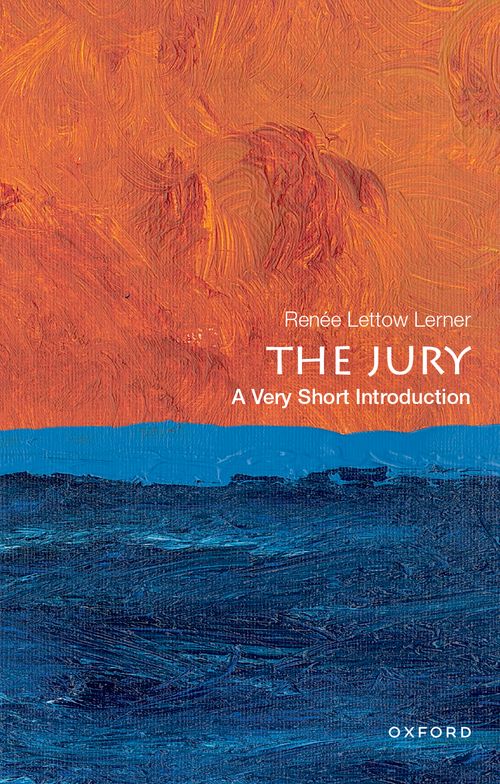Home >
A Very Short Introduction >
The Jury (Law)
A Very Short Introduction | Law
The Jury
ISBN: 9780190923914
Series: A Very Short Introduction
The Jury (Law)
A Very Short Introduction The Jury (Law) Media > Books > Non-Fiction > Education Books Expect Delays of Up to 4 Weeks| Order Below |
ISBN
9780190923914 (10-digit ISBN: 0190923911)
- Description
- Key Features
- Series Description
- Table of Contents
- Offers a historical discussion of the global use of juries throughout history
- Considers the benefits and the challenges of using juries and analyses why the jury trial has declined in English-speaking countries
- Covers both civil and criminal juries, giving the reader well-rounded insight into court systems
Almost every society has professional judges, but from ancient Athens to modern Asia, cultures have wanted ordinary people involved in criminal judgment: the jury. The use of juries comes with challenges; societies must determine how to select jurors, what cases jurors should decide and by what rules, and how to inform jurors about the law and evidence.
This Very Short Introduction shows how and why societies around the world have used juries, charting the spread of the twelve-person jury from England to the British colonies in America, Canada, India, Australia, New Zealand, and the Caribbean. In criminal cases, use of lay jurors stretched to nations in Europe, Latin America, and Asia as they aspired to democracy, greater popular participation in government, and legitimacy of the justice system. But in English-speaking countries, jury trials are declining. Civil juries have been virtually abolished everywhere except the United States, and even there they are rare. Among other painful alternatives chosen by the accused, plea bargaining is now taking the place of criminal jury trials. In this book, Renée Lettow Lerner describes the benefits and challenges of using juries, including jury nullification, and considers how innovations from non-English-speaking countries may hold the key to jurors' survival.
Oxford's Very Short Introductions series offers concise and original introductions to a wide range of subjects--from Islam to Sociology, Politics to Classics, Literary Theory to History, and Archaeology to the Bible.
Not simply a textbook of definitions, each volume in this series provides trenchant and provocative--yet always balanced and complete--discussions of the central issues in a given discipline or field. Every Very Short Introduction gives a readable evolution of the subject in question, demonstrating how the subject has developed and how it has influenced society. Eventually, the series will encompass every major academic discipline, offering all students an accessible and abundant reference library.
Whatever the area of study that one deems important or appealing, whatever the topic that fascinates the general reader, the Very Short Introductions series has a handy and affordable guide that will likely prove indispensable.
Please note: As this series is not ELT material, these titles are not subject to discount.
List of illustrations
Introduction
1. Why use lay jurors? (The ancient and medieval world)
2. Why use lay jurors? (Early modern and modern societies)
3. Jury nullification
4. Who serves as a juror?
5. The scope and structure of the jury
6. The limitations of lay jurors
7. Jury control and avoidance
Epilogue: the future of the jury
References
Further reading
Index
Almost every society has professional judges, but from ancient Athens to modern Asia, cultures have wanted ordinary people involved in criminal judgment: the jury. The use of juries comes with challenges; societies must determine how to select jurors, what cases jurors should decide and by what rules, and how to inform jurors about the law and evidence.
This Very Short Introduction shows how and why societies around the world have used juries, charting the spread of the twelve-person jury from England to the British colonies in America, Canada, India, Australia, New Zealand, and the Caribbean. In criminal cases, use of lay jurors stretched to nations in Europe, Latin America, and Asia as they aspired to democracy, greater popular participation in government, and legitimacy of the justice system. But in English-speaking countries, jury trials are declining. Civil juries have been virtually abolished everywhere except the United States, and even there they are rare. Among other painful alternatives chosen by the accused, plea bargaining is now taking the place of criminal jury trials. In this book, Renée Lettow Lerner describes the benefits and challenges of using juries, including jury nullification, and considers how innovations from non-English-speaking countries may hold the key to jurors' survival.
Key Features
- Offers a historical discussion of the global use of juries throughout history
- Considers the benefits and the challenges of using juries and analyses why the jury trial has declined in English-speaking countries
- Covers both civil and criminal juries, giving the reader well-rounded insight into court systems
Series Description
Oxford's Very Short Introductions series offers concise and original introductions to a wide range of subjects--from Islam to Sociology, Politics to Classics, Literary Theory to History, and Archaeology to the Bible.
Not simply a textbook of definitions, each volume in this series provides trenchant and provocative--yet always balanced and complete--discussions of the central issues in a given discipline or field. Every Very Short Introduction gives a readable evolution of the subject in question, demonstrating how the subject has developed and how it has influenced society. Eventually, the series will encompass every major academic discipline, offering all students an accessible and abundant reference library.
Whatever the area of study that one deems important or appealing, whatever the topic that fascinates the general reader, the Very Short Introductions series has a handy and affordable guide that will likely prove indispensable.
Please note: As this series is not ELT material, these titles are not subject to discount.
EASY ORDER FORM
PRICES LISTED INCLUDE CONSUMPTION TAX
Price Before Tax:
¥1,790


